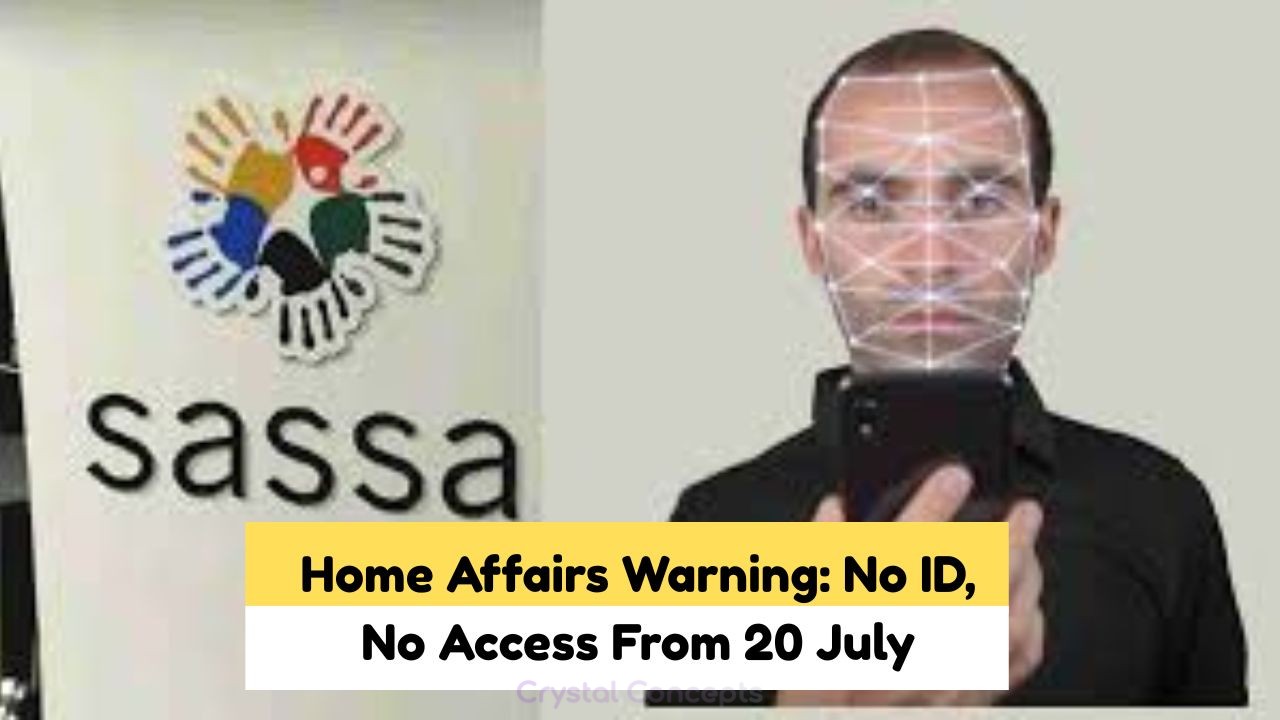Biometric ID for Home Affairs Services: In an effort to streamline and enhance service delivery, South Africa’s Department of Home Affairs has announced a mandatory requirement for biometric identification for all its services starting from 20 July. This significant move is set to revolutionize how citizens interact with governmental processes, ensuring greater security and efficiency in personal identification. By implementing biometrics, which includes fingerprint and facial recognition technologies, the department aims to reduce identity fraud and improve the accuracy of records. This change comes as part of a broader strategy to modernize the department’s operations, reflecting a global trend towards digital identification systems.
Understanding the Biometric ID Requirement
The introduction of the biometric ID requirement by Home Affairs marks a critical shift in the way citizens access various governmental services. Biometric identification utilizes unique physical characteristics to verify an individual’s identity, offering a more secure alternative to traditional methods. Starting from 20 July, all citizens seeking Home Affairs services will need to undergo a biometric verification process. This includes applying for ID documents, passports, and permits. The move is expected to have several benefits:
- Enhanced Security: Biometrics make it significantly harder for individuals to forge identities.
- Efficient Processing: Automated systems can handle requests faster than manual checks.
- Improved Accuracy: Reduces the likelihood of errors in personal records.
- Fraud Prevention: Helps prevent identity theft and fraudulent activities.
- Seamless Integration: Works well with existing digital services and infrastructure.
- Global Alignment: Aligns South Africa with international digital ID standards.
What Services Will Be Affected?
With the implementation of biometric IDs, a wide range of services provided by the Department of Home Affairs will be affected. These services include, but are not limited to, the issuance of national identity documents, passports, marriage and birth certificates, and various permits. The transition to biometric verification means that individuals will need to be physically present at Home Affairs offices to register their biometric data. This requirement will apply to both new applicants and those renewing existing documents. The department has also assured citizens that the process will be made as convenient as possible through increased staffing and extended office hours.
| Service | Requirement | Location |
|---|---|---|
| ID Document | Biometric Verification | Home Affairs Office |
| Passport | Biometric Verification | Home Affairs Office |
| Marriage Certificate | Biometric Verification | Home Affairs Office |
| Birth Certificate | Biometric Verification | Home Affairs Office |
| Permit | Biometric Verification | Home Affairs Office |
How Will This Impact South African Citizens?
The implementation of biometric IDs by Home Affairs is likely to have a profound impact on South African citizens. While the primary goal is to improve security and efficiency, it is essential to consider the implications for individuals across different demographics. For urban dwellers, accessing Home Affairs offices may be relatively straightforward, but those in rural areas could face challenges due to limited infrastructure. To address these concerns, the department is exploring mobile biometric units and partnerships with local service centers.
 Don't Miss Out: NSFAS Promises Complete Loan Cancellation to Thousands if You Apply by 22 July 2025
Don't Miss Out: NSFAS Promises Complete Loan Cancellation to Thousands if You Apply by 22 July 2025
- Accessibility Concerns: Ensuring equitable access to biometric registration facilities.
- Public Awareness: Educating the public on the new requirements and processes.
- Infrastructure Development: Enhancing facilities in under-served areas.
- Privacy Considerations: Safeguarding personal data and addressing privacy concerns.
- Cost Implications: Evaluating the financial impact on citizens and the government.
Biometric Registration Process Explained
To prepare for the new biometric ID requirement, Home Affairs has outlined a clear registration process. Citizens will need to visit their nearest Home Affairs office where their biometric data, such as fingerprints and facial recognition images, will be captured. It is recommended that individuals bring their current ID documents and other necessary identification for verification. The department has assured that the process will be quick and straightforward, minimizing waiting times and ensuring a smooth transition.
| Step | Description | Time Required |
|---|---|---|
| 1 | Visit Nearest Office | 15–30 mins |
| 2 | Biometric Capture | 5–10 mins |
| 3 | Verification | 5 mins |
| 4 | Receive Confirmation | 5 mins |
Addressing Privacy and Security Concerns
The introduction of biometric IDs raises privacy and security considerations that must be addressed to gain public trust. Home Affairs has emphasized its commitment to protecting citizens’ data through robust security protocols and compliance with data protection regulations. The department is implementing advanced encryption technologies to safeguard biometric data against unauthorized access and cyber threats. Additionally, regular audits and security assessments will be conducted to maintain high standards of data integrity.
FAQs
- Why is biometric ID being mandated? The mandate aims to improve security, reduce fraud, and streamline service delivery.
- What if I cannot visit a Home Affairs office? Mobile units and partnerships with local centers are being explored to increase accessibility.
- How will my data be protected? Home Affairs uses encryption and security protocols to protect biometric data.
- Will there be any costs involved? The department has not announced any additional fees for biometric registration.
Upcoming Changes and Expectations
The rollout of biometric IDs is part of a broader initiative by Home Affairs to modernize its services. In the coming months, citizens can expect further advancements in digital services and the integration of biometric systems with other governmental platforms. The department is also planning to introduce online appointment systems to reduce waiting times at offices. These changes are designed to create a more efficient, secure, and user-friendly experience for all South Africans.
- Online Appointments: Streamlining the appointment process to reduce office congestion.
- Mobile Biometric Units: Bringing services closer to remote communities.
- Enhanced Digital Platforms: Integrating biometrics with existing digital services.
- Continual Feedback: Engaging with the public to refine and improve processes.
Looking Ahead: Future of Biometric Services
As the Department of Home Affairs moves forward with biometric IDs, the future of governmental services in South Africa looks promising. The integration of biometrics is expected to lead to more innovative solutions and improved public service delivery. By embracing these technological advancements, South Africa aligns itself with international trends and sets a precedent for neighboring countries. The department is committed to ensuring that the transition is seamless and beneficial for all citizens, paving the way for a more secure and efficient governmental system.
| Year | Milestone | Objective |
|---|---|---|
| 2023 | Biometric ID Rollout | Mandatory for all services |
| 2024 | Digital Integration | Linking biometrics to other platforms |
| 2025 | Enhanced Services | Improved public service delivery |
| 2026 | Regional Expansion | Extending services to remote areas |
Public Engagement and Feedback
Engagement with the public is crucial as Home Affairs implements biometric IDs. The department encourages citizens to provide feedback on their experiences and any challenges faced during the registration process. This input will be invaluable in refining the system and ensuring that it meets the needs of all South Africans. Through open communication and transparency, Home Affairs aims to build trust and foster cooperation with the public as it embarks on this transformative journey.
Stay Informed and Prepared
As the deadline approaches, it is essential for citizens to stay informed and prepared for the upcoming changes. Regular updates and information will be provided through various media channels to ensure that everyone is aware of the new requirements and processes. By proactively engaging with these changes, citizens can ensure a smooth transition to the new biometric ID system.
Feedback and Support
The Department of Home Affairs values the feedback and support of the public. Citizens are encouraged to reach out with any questions or concerns regarding the biometric ID implementation. This dialogue is vital for the continuous improvement and success of the initiative.
Biometric Services: A Step Forward
The introduction of biometric IDs represents a significant step forward for South Africa. By adopting cutting-edge technology, the country is poised to enhance its public service delivery and set a benchmark for innovation in governmental processes.
Looking to the Future
As South Africa embraces biometric IDs, the future of public services looks bright. The integration of advanced technologies promises to revolutionize the way citizens interact with governmental systems, offering a more secure and efficient experience for all.
Continuous Improvement
The Department of Home Affairs is committed to continuous improvement and innovation. By leveraging public feedback and technological advancements, it aims to create a seamless and effective service experience for all South Africans.









